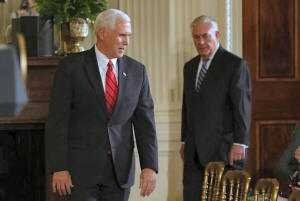|
Trump administration sends conflicting
signals on Russia sanctions
 Send a link to a friend
Send a link to a friend
 [August 02, 2017]
By Yeganeh Torbati [August 02, 2017]
By Yeganeh Torbati
WASHINGTON (Reuters) - President Donald
Trump grudgingly accepted new congressional sanctions on Russia, the top
U.S. diplomat said on Tuesday, remarks in contrast with those of Vice
President Mike Pence, who said the bill showed Trump and Congress
speaking "with a unified voice."
The U.S. Congress voted last week by overwhelming margins for sanctions
to punish the Russian government over interference in the 2016
presidential election, annexation of Crimea and other perceived
violations of international norms.
U.S. Secretary of State Rex Tillerson told reporters that he and Trump
did not believe the new sanctions would "be helpful to our efforts" on
diplomacy with Russia.
Trump has been clear that he wants to improve relations with Russia, a
desire that has been hamstrung by findings of U.S. intelligence agencies
that Russia interfered to help the Republican against Democrat Hillary
Clinton. U.S. congressional panels and a special counsel are
investigating. Moscow denies any meddling and Trump denies any collusion
by his campaign.

Tillerson, who did business in Russia when he was chief executive of
Exxon Mobil, has said repeatedly that the world's two major nuclear
powers cannot have such a bad relationship.
"The action by the Congress to put these sanctions in place and the way
they did, neither the President nor I were very happy about that,"
Tillerson said. "We were clear that we didn't think it was going to be
helpful to our efforts, but that's the decision they made, they made it
in a very overwhelming way. I think the president accepts that."
Tillerson stopped short of saying definitively that Trump would sign the
sanctions, saying only that "all indications are he will sign that
bill."
Vice President Mike Pence, at a press conference in Georgia with Prime
Minister Giorgi Kvirikashvili, said unequivocally that "President Trump
will sign the Russia sanctions bill soon."
Pence acknowledged that the administration objected to earlier versions
of the sanctions bill because it did not grant enough flexibility to the
administration, but said it "improved significantly" in later versions.
[to top of second column] |

Vice President Mike Pence (L) arrives with Secretary of State Rex
Tillerson (R) to attend a joint press conference held by U.S.
President Donald Trump and Colombian President Juan Manuel Santos at
the White House in Washington, U.S., May 18, 2017. REUTERS/Yuri
Gripas

"And let me say that in signing the sanction, our President and our
Congress are speaking with a unified voice," Pence said.
White House spokeswoman Sarah Sanders said on Tuesday the sanctions
bill was under review and would be signed.
"There's nothing holding him back," Sanders said at a news briefing.
Trump has until Aug. 9 to sign the bill, or veto it, or it will
automatically become law.
In retaliation for the sanctions, Russian President Vladimir Putin
said on Sunday that the U.S. diplomatic mission in Russia must
reduce its staff by 755 people. Russia is also seizing two
properties near Moscow used by American diplomats.
Tillerson said Putin probably believes his response was a
symmetrical action to Washington seizing two Russian properties in
the United States and expelling 35 diplomats last December.
"Of course it makes our lives more difficult," he said.
Tillerson said he and Russian Foreign Minister Sergei Lavrov would
meet in Manila on the margins of next weekend's meetings of the
Association of Southeast Asian Nations.
(Reporting by Yeganeh Torbati; additional reporting by Ayesha Rascoe
and Patricia Zengerle; editing by Grant McCool)
[© 2017 Thomson Reuters. All rights
reserved.]
Copyright 2017 Reuters. All rights reserved. This material may not be published,
broadcast, rewritten or redistributed.

 |